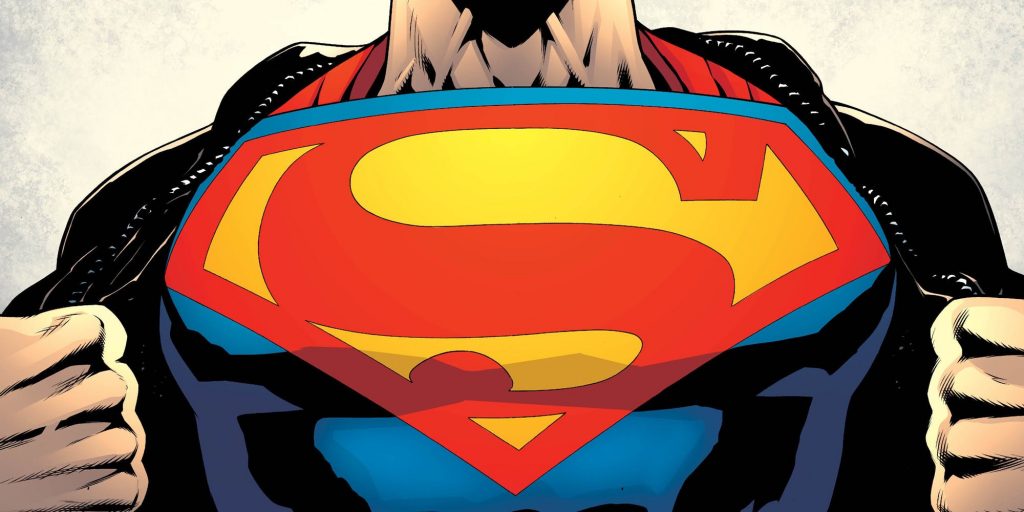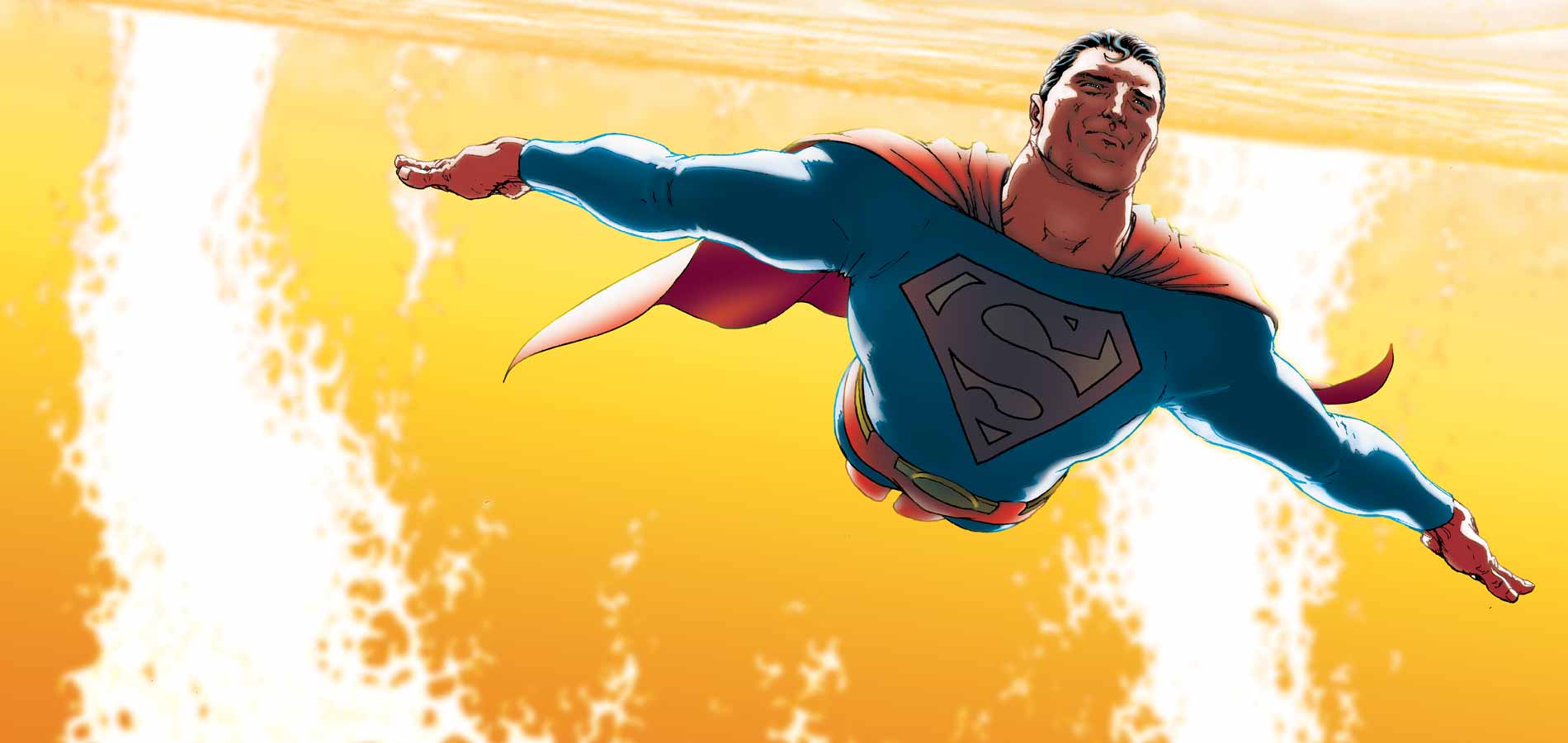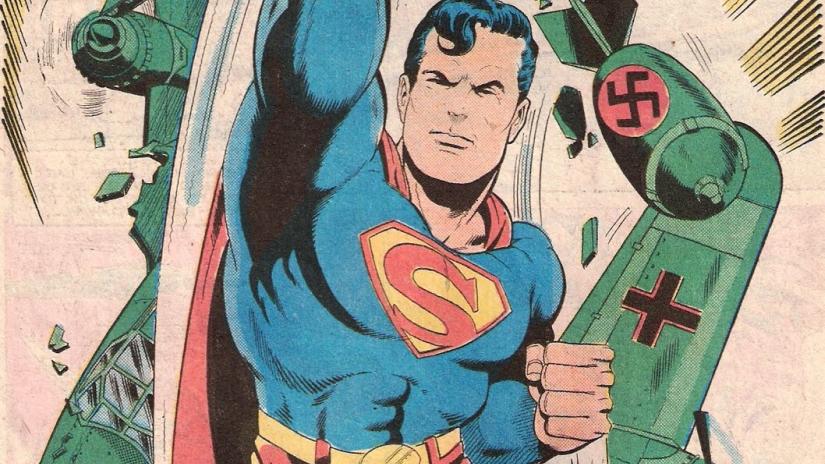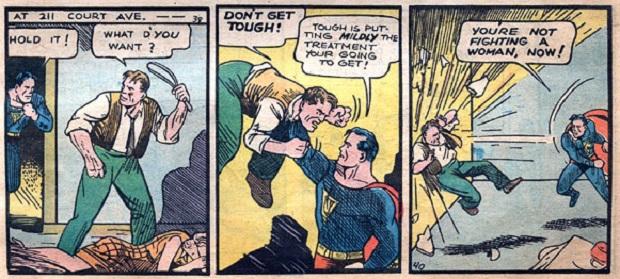
In My Humble Opinion - Superman, Injustice And The Nature Of Goodness
This article was originally published at NotThePopularOpinion.Wordpress.Com
Let’s do some Superman again, Opinionnerds!
So once again I come face to face with criticisms of Man of Steel related to the development of the Superman character in the film. This time someone pulled out an all time favorite criticism; why does Superman want to help anyone? As a comparison, the commenter pointed to Batman Begins and Iron Man as examples of stories where our hero’s have a clear motivation for doing what they do, then stating of Superman, “I don’t know this character any better by the end of the movie. Why does he even WANT to help people?” Now, setting aside the terrible comparisons (Batman and Iron Man’s motivations are the cornerstones of their characters, unlike Superman) and even worse criticism (seriously, after all the adaptations there have been over the years why is it suddenly Man of Steel’s burden to define Superman’s motivations?) I will admit that this is actually an intriguing question; why DOES Superman help people?
Looking For A Good Reason
When I was just a wee nerd growing up in and around the Detroit area in the early 80’s I don’t remember ever contemplating why Superman felt the need to help people. Over the years I’ve looked into the question from time to time without a lot of success; finding theories and ideas more than answers. One of the most widely accepted theories states that Superman helps people because his human parents taught him good morals and values. It’s nice, but in my article on the subject of how Superman is raised (In My Humble Opinion – How Do You Raise A Superman?) I take a look at how the comics portray the relationship between the Kent’s and Clark and I point out that in his first year of publication Superman didn’t rvrn have human parents; he was raised by the state (Action Comics #1). In the next year his story is altered and he is taken in by the Kent’s, but the books skip over his young life and give us a fully formed Superman, so we don’t know anything about how he was raised other than his father tells him he has to hide his powers so people won’t fear him (Superman #1). In the second issue of writer Mark Waid’s Superman: Birthright, we see that Superman can see an aura created by living things and it deeply saddens him when when that energy is gone. So presumably he helps to protect that light from being extinguished prematurely. That, along with a pointed piece of dialog about how he was raised again, is meant to provide that elusive answer. This issue of rearing might explain his choice in methodology, why he isn’t cruel or judgmental in his actions, but it still doesn’t explain how the initial fire to create Superman was sparked in him.
All of this questioning seems rather cynical, especially in light of the character we’re discussing. One of the core precepts of Superman has always been that he is good just for the sake of it. Captain America was created to fight a war, Spider-Man operates from a place of guilt, Batman from a place of vengeance, Tony Stark created the Iron Man tech to save his own life. Even the original Captain Marvel was tasked with a duty to protect. Superman is one of the very few characters who does what he does simply because he chooses to do it – it has always been this way and any attempt to alter that feels as if it strips the character of some intrinsic quality. No matter how you feel Superman’s personality should be shaped, this one aspect has always been consistent. After the Spider-Man films, Batman Begins and Iron Man we became obsessed with hero origins, specifically what motivates them to act, so it’s only natural that people would want to see this standard applied to Superman. But maybe it’s a question that shouldn’t be answered in canon. After all, if you have to give Superman a motivation to act is he really still Superman?
A Brief History Of Time
Even though the character of Superman may not have a specific motivation for what he does, the men who created him must have. Nothing occurs in a vacuum and fictional characters do not develop traits on their own – someone has to imbue that character with those traits and there is usually a purpose for doing so. As a quick history lesson, Superman was created by Jerry Siegel and Joe Shuster, the children of Jewish immigrants. The character we know as Superman was created in 1933 and finally saw publication in 1938. It has long been noted that Superman shares connective tissue with the Jewish faith – his nature as a clear Moses allegory being the most obvious – but I’ve never seen anyone tackle this question of Superman’s inherent goodness and his drive to help from the angle of religion though. My being an atheist, I likely never would have considered it had I not heard the writer Johnathon Weismann on NPR. Johnathon was being interviewed about his run in with an army of anti-Semitic Twitter trolls and how, instead of cowering or ignoring them, he chose to out these people. Johnathon made a comment to the effect that the Jewish faith makes it incumbent upon it’s people to tackle injustice wherever it appears. While I don’t follow a religion, I do believe that there is a flow to the energy of existence and this comment just happened to appear at a time I was contemplating this exact Superman question. You can call it a spark of the divine if you like, but however you choose to define it I found it an incredible opportunity for a little exploration.
So I must make sure to impress upon you, Opinionnerds, that I am not a religious scholar. I have done some reading on the subject, even reaching out to the Rabbi’s at Chabat.Org for a little direction. I’m trying to draw my observations from a pool that, while it may not be very deep, is fairly concentrated. I’ll give you what I’ve learned the best I can but it might not be the most comprehensive take on it. I suggest if the topic interest go read something and write your own damn article. And when you do; make sure to link me to it! What I mean to say is don’t just take my word for it – go learn yourself something!
Injustice And The Torah
I searched around on the net trying to find information on why it is the Jewish people are driven to tackle injustice. I started out looking specifically under the banner of, “injustice” as an idea unto itself but this proved rather fruitless. There are a number of articles I found that speak about why it’s important to tackle injustice, but nothing that really drilled down on what it is in the faith that motivates that. And remember I’m still looking for a way to link this to Superman; so I’m looking for some very specific information. I found a lot of interesting points but a great majority of them end up pointing to one mitzvah (commandment) or another, or passages that declare, “justice is more sought by god than sacrifice”. Yehovah commands justice from his people by telling them to appoint judges to “appoint judges and officials for your tribes . . . and they shall govern the people with due justice. You shall not judge unfairly” (Deuteronomy 16:18). As Rabbi Bradley Artson concludes in his essay, “Justice, Justice You Shall Pursue”;
That having been said, it remains to assert — as a matter of Jewish integrity and a rebuttal of those who would tailor Judaism to fit a Christian mold–that ethics and a passion for justice remain the engines driving the entire Jewish enterprise. Rituals are essential and beautiful, but they remain frosting. Goodness, justice and decency form the base. As the Torah insists, “Justice, justice shall you pursue.”
This deeply ingrained idea that justice must be sought, and by extension injustice remedied, is so rooted into the fabric of the Jewish culture that these young men must have taken it as a given that their hero would be a hero of the people and driven to take up the peoples causes. As I’ve pointed out a number of times, Superman’s earliest adventures portrayed him as a crusader for social justice. One of the many aspects of Zack Snyder’s Batman v Superman: Dawn of Justice I so dearly love is, when faced with situation that affects his standing in the world, Clark Kent chooses to take on the Batman issue instead. He does so not because he believes him a villain, but because his actions are harmful to the people in the area surrounding the Port of Gotham; that, “civil liberties are being trampled on. Good people living in fear.” Clark takes up a cause of the people as a journalist first, not as a super-hero. This is reflected in other iterations of the character as well, using his position as a journalist to take up social causes. In this way, Superman could be both a reflection of Siegel and Shusters devotion to their faith as well as an example of some of the best aspects of that faith in a time when a swirling tornado of chaos was descending upon Jews around the world. What better way to celebrate your people and your faith then to give the world a hero that uses key tenants of that faith to fight for everyone at a time when we were being dangerously divided?
Cultivating Compassion
While this was a fascinating look into why Superman’s creators had him fight for justice and righteousness it still didn’t explain what in the characters makeup spurred him to pursue these things. Without having created a clear motivation, and remember that when Superman was created there were no Kent’s to guide him, what reason could he have had to pursue the path he chose? Again, while there is nothing written to back up this choice, I do believe that there is a reasoning his creators used. Consider a passage from an essay by Dr. Yitzchok Block that was provided to me by Rabbi Eliezer Zalmanov at Chabat.org. (What is Morality?) Under the section titled The Necessity of Goodness, Dr. Block states that if you have a talent that enhances your life, you should try to develop it. If, however, that talent is God-given, then you have a responsibility to develop that talent.
“If the Creator of Heaven and Earth has given someone a talent that enhances the value and the goodness of human life, then one has a categorical responsibility to nourish this talent. That is, it is not up to one’s individual choice to decide whether one should develop it.”
Dr. Block presents the idea that compassion can be seen as a, “ talent for goodness”, and that goodness is essential to human life. Compassion can be basically defined as sympathy – we feel bad when we see others feel bad. This can be looked at as either a divine gift or an evolutionary development whatever lofts your transprt craft. With the exception of those that have some form of neurological damage, defect or mental illness this is present in all of us, and the degree to which we feel this sympathy can be defined as our, “talent for goodness”. Mine is a crude way of looking at it but it’s one of those concepts that is both incredibly complex and dumbfoundingly simple at once. People tend to gravitate towards the things they are good at, as we get pleasure from doing these things. People who are more compassionate, or possessed of a greater, “talent” for good, will tend to gravitate towards things that allow them to act on that talent. This doesn’t even have to be looked at from a religious point of view – a simple observation of yourself will tell that tale. However, if this is part of the Torah these men were raised with, it makes sense that this way of looking at life would seep into their work while creating a hero. After all; what is a hero if not an example of the good in people? How can we relate this to Superman specifically? Though we can say that the idea might have been present in the creators minds while they were conceiving the character how is this idea implemented in the characters make up? Let’s try to examine it without the lens of the divine spark and see if we can’t apply the basic concept to the character.
At some point in his life, young Clark Kent found he had a, “talent for goodness” or that he was possessed of a great sense of compassion. Like someone who’s naturally talented in sports or music, it’s just something he’s got for whatever reason he has it. And he’s really good at it. If goodness can be a talent then Clark is a child prodigy! This sense of compassion leads him to a desire to help people; he feels good when he applies his talent. But Clark is different than other people; he can do things others can’t. As Clark ages he begins to marry his expanded abilities to his sense of compassion; he finds he can help more people and, in turn, receives greater pleasure from doing so. It becomes a self feeding system – his powers let him help more people, the more people he helps the better he feels, the better he feels the more people he wants to help and his powers let him help more people. Like any talent, this talent for goodness has to be cultivated – having an aptitude for piano doesn’t mean you go straight to Carnegie Hall, you have to practice. As anyone who has tried to hone a talent can tell you the day to day grind of working that talent into a skill can be a frustrating process and there are days when you just want to bag the whole thing. Such as it must be with Superman. Compassion is active; you must actively feel compassion and, if you decide to help, you must decide how best to do that. So learning how best to help people has to be a process for Superman; one that never ends. There are days when that process is going to be hard as there will be times when even Superman must begin to push the limits of his compassion. What makes him Superman is that he never reaches, “fuck it”; that point at which his ability to feel compassion is overwhelmed. He might get close, but he never quite gets there. That’s why he’s Superman and others aren’t. It isn’t because he doesn’t kill or because he never loses hope; it’s because he never stops caring. This might be a self serving observation as it falls in line with the image of the character I already hold, but I don’t think that makes it any less valid.

Bring It Back To Me
The idea of Superman’s innate goodness is a double edged sword that cuts right through the heart of the character. On the one hand it provides him a foundation to build the character on that extends beyond his oft copied abilities. On the other hand, if not handled properly, it becomes a divisive factor in his portrayal that can make him uninteresting. After all, an objectively good character can always be counted on to make the objectively right choice in any given situation. You add that to a powerset almost without limit and you no longer have a dramatic character – you have “God”. And no offense to those of you who are believers, but there’s a reason why, “God” doesn’t have his own comic book.
I’m not writing this as an endorsement of religion. My long standing position on religion has always been, “Whatever anyone chooses to believe is fine with me all the way up until begins to hurt anyone, including themselves.” But I’m also a bit if a philosophical scavenger, a habit I inherited from my mother. I’ll take little bits of whatever I feel enhances my life and deepens my understanding of the world around me. Investigating this topic has been a brief but fascinating look into an aspect of human nature I might not have considered on my own. This is the continuing power of super heroes for me. The story of the heroes we love is really the story of us. It’s myth making in slow motion and we get a front seat to the whole process. And like all myths we get so caught up in how the stories make us feel that we will willingly toss aside the history that gives them weight and relevance in the first place.
Anyone who has discussed Superman with me or read my other articles knows I like the idea of a Superman that exemplifies the struggle to achieve greatness more than one has already achieved it. I want my Superman to always be a work in progress instead of the end result. Existing as a being of compassion and the quest for justice are never ending pursuits that require constant maintenance. The closer a writer gets Superman to the goal of moral perfection the further away from the point I feel they have gotten and, consequently, the less interested in the character I become. When that happens I often look back to try and remember the history that gave that character to us to begin with. Now I have some new cloth to weave into that tapestry. I hope this has given you something to think about to, Opinionnerds. We all have that same spark of compassion within us, and we can all try and develop that talent as best we can. Being an example of that journey; I think that’s Superman’s most heroic trait.
Clever endings aren’t my bag.
Laterz
(Follow *NotThePopularOpinion on Twitter @Only_Grey)
Share the post "In My Humble Opinion – Superman, Injustice And The Nature Of Goodness"


